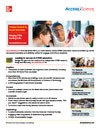On April 7, 2021, the U.S. Centers for Disease Control and Prevention (CDC) announced that a genetic variant of SARS-CoV-2—the coronavirus that causes COVID-19—that was initially identified in the United Kingdom is the dominant form of the virus circulating in the United States. Genetic variants have altered nucleotide sequences from their original forms. The dominant variant in the United States—officially known as lineage B.1.1.7 and commonly termed the British or UK variant—is a mutated form of the COVID coronavirus that was first detected in Wuhan, China, in late 2019 and that subsequently spread around the world. However, the UK variant is not only a threat in the United States; it is one of several mutant forms of SARS-CoV-2 that have been detected in different countries throughout the globe. Scientists are particularly concerned because the UK variant and some other mutated virus strains have greater virulence than the original (wild-type) form of the virus. Reports indicate that the UK variant is more transmissible, or infectious, even among younger individuals (ages 30 to 50), in comparison to the wild type and thus may lead to higher levels of sickness and death due to COVID-19. So far, the vaccines being used to counter COVID-19 are effective against the known variants. However, certain variants pose a potentially greater risk to individuals who are not vaccinated. See also: Coronavirus; Infectious disease; Novel coronavirus is declared a global pandemic; Searching for a COVID-19 vaccine; Vaccination; Virulence; Virus

Many viruses, including coronaviruses, store their genetic information in the form of ribonucleic acid (RNA). In contrast, most other organisms use deoxyribonucleic acid (DNA) as the carrier of genetic material. RNA has less integrity than DNA and therefore is more prone to common and random mistakes or errors—termed mutations—in the genetic code. However, in the vast majority of cases, mutations do not affect the transmissibility or virulence of a virus. In fact, most mutations have no effect on a virus or are detrimental to it. Some mutations, though, may have an advantageous effect, allowing a virus to spread more easily and thus making it more contagious. Due to selective pressures, this more-contagious virus may then survive and replicate more efficiently, becoming a dominant strain among the host population. See also: Deoxyribonucleic acid (DNA); Genetic code; Genetics; Mutation; Ribonucleic acid (RNA)
Coronaviruses are named for the crown-like spike proteins on their surfaces. Spike proteins enable coronaviruses to bind to, enter, and infect host cells, where the viruses can replicate and then disseminate to other hosts. Moreover, spike proteins are the chief targets for antibodies produced by the body as an immune defense against the coronavirus. Thus, any mutation that affects spike proteins may potentially allow the virus to evade—to varying degrees—any previously formed antibodies, whether those antibodies are derived from an actual COVID infection or from a vaccine. In fact, spike-protein mutations are prevalent in the aforementioned UK variant and other virulent variants. Fortunately, developers of the vaccines approved for use against SARS-CoV-2 accounted for the likelihood of numerous spike-protein structural changes, and the respective vaccines were created to respond effectively to many different variations. Thus, despite mutations affecting the spike proteins of SARS-CoV-2, individuals who are vaccinated should be capable of fighting off viral infection. See also: Antibody; Protein
In addition to the UK variant, several other mutant strains have shown enhanced degrees of transmission and disease severity. These strains include variants first identified in Brazil (lineage P.1); South Africa (lineage B.1.351); Nigeria (lineage B.1.525); and California, United States (lineages B.1.427 and B.1.429). All of these variants have spread beyond their original geographical boundaries and have been detected in locations elsewhere in the world. The only way to halt the spread of these and other variants is to stop the virus from infecting more people. If the virus cannot infect a new person (that is, a new host), then it cannot replicate and therefore cannot mutate. Depending on the course that the COVID pandemic takes in the future, it is possible that booster vaccine shots to improve protection against any emergent variant (or variants) may be necessary to fully protect the public. See also: Epidemiology; Public health





